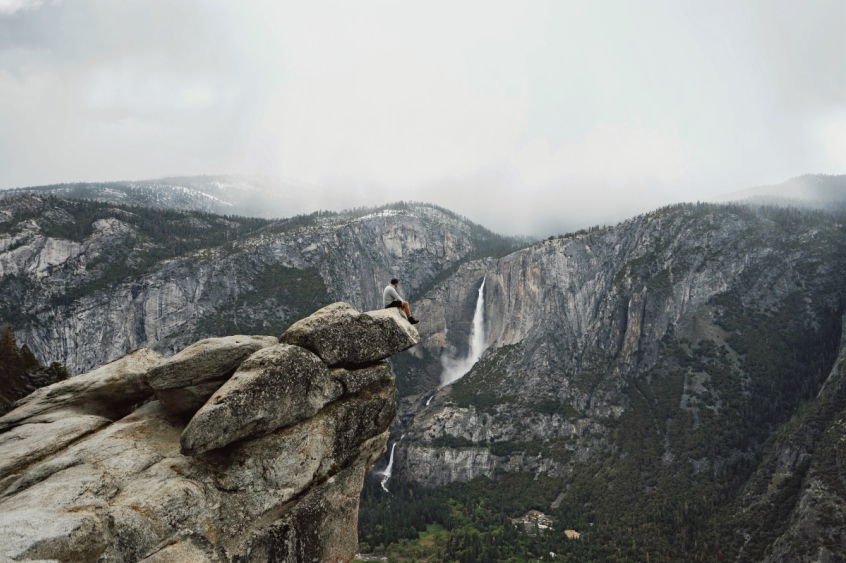
As the news came out with the new Nashville Statement and Denver Statements, I wanted to articulate why I call myself a gay (or same-sex attracted) celibate Christian. The deeper reasons for this will be outlined in my up coming book, A War of Loves: The Story of a Gay Rights Activist Who Finds Jesus Christ. I wanted to write and clarify what I mean and why I use this term. As someone who became a Christian from being an anti-Christian gay activist, I do not, in every sense, want to distance myself from the community I come from and which I love and labour for in the Gospel.
The first reason is to maintain scriptural authority. Whilst scripture is clear homosexual acts are sinful, it also clearly maintains that the born again or regenerate Christian lives in tension between their fallen nature, or 'flesh', that is at enmity with God and the new self, which now desires to love and obey God. When we become born again believers, our flesh is crucified with Christ but is also still present in moments of temptation or testing. Our victories in Christ are manifested in our weakness and in our fallen flesh, not in a perfected body. Conversely, the regenerate self is born when we believe, repent from unrighteousness, and receive Jesus as our personal Lord and Saviour. being indwelt by the Holy Spirit. John holds these two realities in tension: 'If we claim to be without sin, we deceive ourselves and the truth is not in us.'
Finding the moral empowering – and the grace and consolation – of the Holy Spirit 'in homosexual terms' is, it seems to me, what leads many of us to label ourselves 'celibate gay Christians'. To deny the present struggle and say I've been 'healed' from all temptations of the flesh is often the error the Corinthians made of thinking they were already resurrected or without a flesh and yet behind closed doors were still indulging sinful behaviours. The scholar Anthony Thiselton coins it, "over-realised eschatology." On the flipside, to deny that God will not transform us to live in victory over these desires is to commit the error of "under-realised eschatology." In other words, we are still being made holy and we aren't yet perfect. These are both scriptural errors that lead to sinfulness, to endorse or to deny the presence of such fallen desires is equally wrong, and hence why I call myself a gay celibate Christian.
My second reason is theological accuracy. For the gay or same-sex attracted person, this biblical vision of what it means to be redeemed is particularly complex. It is not like an addiction to alcohol, or a stronghold of judging others with pride, which are voluntary behaviours. To be attracted to the same sex is not a voluntary behaviour, but a result of the Fall. As Wesley Hill, a New Testament Professor and gay celibate Christian, states: 'Many suggest that a parallel case would be if someone were to label himself an "adulterous Christian" or a "stealing Christian". Those terms are self-evidently problematic in that they make sinful behaviors part of an identity description for believers, and therefore gay Christians should find their chosen label equally problematic.
'My response to this is that those are not, in fact, parallel cases. "Gay" in current parlance doesn't necessarily refer to sexual behavior; it can just as easily refer to one's sexual orientation and say nothing, one way or the other, about how one is choosing to express that orientation. So, whereas "stealing Christian" certainly denotes the behavior of stealing, "gay Christian" may simply refer to the erotic inclinations of the Christian who claims that identity and leave open the question of whether he or she is sexually active with members of his or her own sex.'
This is why I rarely, if ever, use the phrase 'gay Christian' without adding another adjective: 'celibate', meaning committed to a life of chasteness in Christ. To call myself a 'celibate gay Christian' specifies both my sexual orientation and the way I'm choosing to live it out. While it's not bad to desire companionship because humans were made in the image of God as relational beings, the reality is that we have all been impacted by the Fall. There's a particular entanglement for gay or same-sex attracted people in that the image of God and our fallen sexual desires mean that we cannot just simply enter into a union between one man and one woman. This is the very difficult conundrum we face.
Regeneration untangles the sinful aspect from the God-given desire for intimacy through celibacy or, for some, a special grace to be married to a particular member of the opposite sex. Very few homosexual people report that when they become Christians, these desires simply disappear. Rather, most find that these desires do not change, but that God gives them a special empowering grace to either be celibate or married. In my case, I have chosen a default of celibacy.
My third reason is to be prophetic. Those of us who are orthodox, evangelical Christians with same-sex attractions need to reclaim the label back from secular culture. Like those who are gay and actively in relationships, we have all had a similar experience with the same fallen desires and dealing with them in a fallen world that is prejudiced and unloving. We have the unique opportunity to break a culture of victimhood and restore a culture of dignity. The opposite of homosexuality is not heterosexuality, it is holiness. We need to stand for a different way to live in the gay community, and welcome them into the Church to receive Jesus' love. Also, many of those pressured by Christian culture to say they have been "healed" live with secret sexual sin and shame. We must break such a culture of silence in many churches and encourage a culture of repentant honesty before God and with each other. Anything else will allow spiritual darkness to fester, grieving the Spirit of truth.
The fourth reason is related to identity. When Christians receive Christ, we repent from what is sinful in our lives. But that doesn't mean we have to renounce our particular humanity which is shaped both by God and our experience in this fallen world and this fallen body. As a gay celibate Christian, Christ is my ultimate identity; gay and celibate come second. My identity is first and foremost in Christ, but secondarily anchored in the redemptive story of God's grace in my life.
The fifth reason is reconciliatory (or, to love my 'enemies'). I was saved when I was heavily involved in the gay rights movement, and I know not everything in the gay community is evil, 'licentious', or wrong, but rather the gay community is full of people who are loved by God and need to know His love and gospel. Furthermore, I am often opposed or attacked for my stance by the gay world as well as the Christian world. We as Christians have built a prejudiced stereotype and generalisation of the gay community. Promiscuity and sexual orientation must be separated in our thinking. Similarly, with the Samaritans, Jesus ignored the taboo of his day and went to speak to arguably one of the most "morally questionable" peoples of his time; not just that, but he also spoke to the woman at the well who also had a sexually broken past. There is a distinction between the gay scene, which is commercial, broken, and sexually libertine, and the gay community which is composed of all people who experience same-sex desire.
My sixth reason is strategic. Paul was a Jew and remained a Jewish Christian. However, his view of Judaism changed. The Law no longer made him right with God, but faith in Christ through grace. Paul was unique and in the rare situation of being both a Jewish national and a Roman citizen. His Roman citizenship protected him from certain deadly persecutions and opened huge doors for the Gospel. Like Paul, I and others like me have the unique capacity to speak to both gay culture and Christian culture. I still identify as a gay person but have given my sexuality entirely to God and died to it, letting it be crucified with Christ submitting to God's teaching that marriage is between one man and one woman and the only context for sexual intimacy.
My seventh and final reason is evangelistic. Mainstream secular culture does not understand the term 'same-sex attracted' and feels alienated by the term the 'gay lifestyle'. In the ministry I have been called to, I want to focus on in removing boundaries, both existential, intellectual, and spiritual to the gospel. Identifying in some way with others in the gay world opens a unique door to share the gospel, and speaks against the horrible treatment Christians have often meted out to the gay community.
For these and intellectual reasons, I cannot sign the Nashville Statement (and even more so the Denver statement for that matter!), especially article 7: 'We deny that adopting a homosexual or transgender self-conception is consistent with God's holy purposes as revealed in creation and redemption.' This is a blatant misunderstanding of Christian eschatology – people are not finally redeemed yet although marked for such redemption and thus must be real and honest about their humanity, broken and otherwise, identifying in their weakness as well as their strength. Same-sex attraction is a unique and complex entanglement of the image of God and the fallen human flesh or sin nature. To deny this, is to commit the error of 'over-realised eschatology', thinking Heaven has now come and the human flesh has disappeared, even if being crucified. It is to cut off the human good of desiring a partner embedded in homosexual or erotic desire, branding it entirely wrong or sinful.
It is not like other situations. Homosexual experience and identity needs to be listened to, understood and a new identity developed in Christ that can incorporate that reality in celibacy or interorientation marriage without leading to sinful realities like SSM marriage, forced marriages that are not given by grace or legalistic celibacy. I am deeply disappointed with the lack of conversation around this statement and it shows a failure to understand the anthropology of repentant SSA/gay people who choose to identify with the LGBTQI community on the level of their plight in 76 nations where it is illegal and seven nations where they can be executed and the incredible pain they go through, including the plight of thousands of refugees fleeing because of this from Russia, the Middle-east etc. This statement falsely makes the narrow path Jesus has designed pharisaically narrower. This is not Jesus' way.
I was once an anti-Christian gay rights activist who knows that to be on the other side. I vote no. I would sign if certain articles were better qualified to what exactly homosexual or transgender self-conception means. The theological anthropology present is erring on clumsily biblicist, not biblical exegesis and the statements do not represent all evangelically minded people. Until I see that, my response is no. Let's not communicate in a way that shuts down people like myself who are trying to reach the LGBTQI community with the true Gospel of Jesus Christ and who are standing against the onslaught of liberal attacks on us. The last thing we need is friendly fire. I deeply love and respect my brothers and sisters of all kinds and stand in grace as we all work this out but for now I say no. We must lead from the front with the love and truth of Jesus Christ together, not from behind with a limited understanding of homosexual experience. I am praying for a better way forward in that grace – will you join me?
David Bennett will be telling his personal story from being an anti-Christian gay rights activist to meeting God in a pub, in 'A War of Loves' (published by Zondervan next year). He has completed first class postgraduate studies in theology this year at Oxford University and will be heading to complete a masters at St Andrews, Scotland.This is an edited version of a post that first appeared here.













